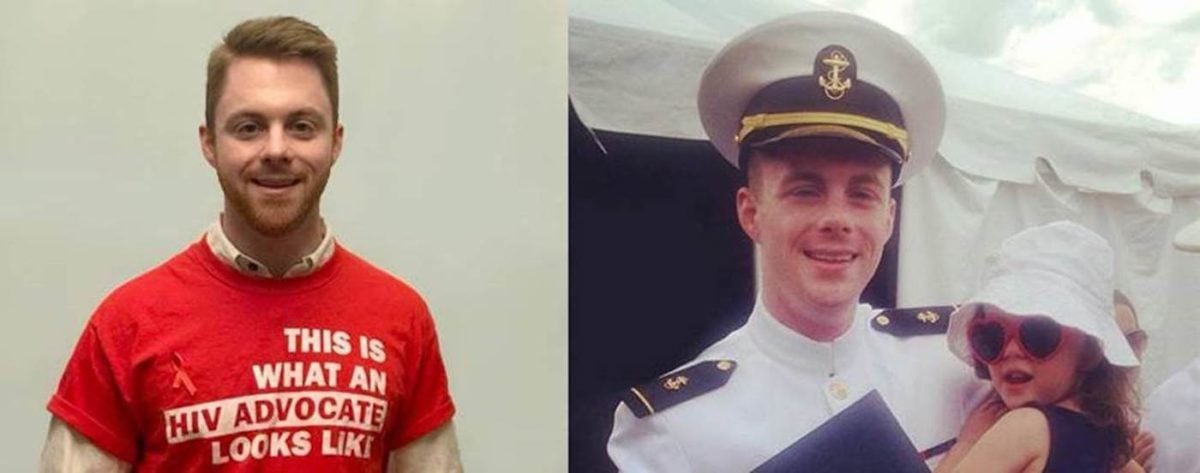
Kevin Deese has sued the Trump Administration because he was rejected from joining the U.S. military due to his HIV status. A federal judge told Deese last week that his case can proceed to trial. Photo: Lambda Legal.
In three federal court cases, the Trump Administration is defending its discriminatory policies that target HIV positive people in the military.
The cases have been filed by five service members facing discharge or denied commissions due to their HIV status.
In court documents, medical experts argue the Pentagon’s policies are irrational and discriminatory given the strides in HIV diagnosis and treatment that suppress viral loads to undetectable levels, meaning the virus can’t be transmitted.
The Trump Administration and Pentagon believe that people living with HIV are “unfit for military service,” according to court documents.
Trump Administration wants to discharge all HIV positive soldiers
Under current policy, people with HIV cannot join the U.S. military, but people diagnosed after their enlistment can remain in the armed forces under strict regulations.
A 1991 Pentagon directive bars HIV-positive service members from deploying overseas, but does not prohibit them from serving in other capacities.
HIV positive service members
On Monday, lawyers for three plaintiffs asked a Virginia judge to stop the Trump Administration and the Pentagon from discharging people who are HIV positive and refusing to let them enlist, deploy, or commission as an officer.
Last week, a Maryland judge told two plaintiffs that their lawsuit against the Trump Administration can proceed, and they will have their day in court. The Trump Administration had asked the court to dismiss the lawsuit, but the court denied the request.
The case is Deese and Doe v. Esper and involves two cadets who were rejected from the U.S. Navy and U.S. Air Force based on their HIV status.
In his ruling, Judge Richard D. Bennett of the U.S. District Court for the District of Maryland, said, “There is simply no basis to hold that officers must be free from HIV even if they are physically capable of service and would otherwise be able to deploy.
“The military’s policy of withholding officer commissions from HIV-positive service members renders those service members second-class citizens,” Bennett said. “That is precisely what the equal protection clause forbids.”
Oral arguments
During oral arguments on two related lawsuits before the U.S. District Court for the Eastern District of Virginia, lawyers on Monday argued that the Pentagon’s policy of banning people living with HIV from enlistment, deployment, or commissioning is unconstitutional.
The attorneys also asked the court to order the Defense Department to allow service members living with HIV to deploy and serve as officers.
“Today, we asked the court to recognize what the government refuses to acknowledge, that people living with HIV are as capable, safe and healthy to serve in the military as any other person,” said Scott Schoettes, an attorney with Lambda Legal, one of the legal groups representing the plaintiffs. “It is discriminatory and unconstitutional to deprive these service members from serving their country because of outdated science and continuing prejudice.”
During the oral arguments phase, Judge Leonie Brinkema of U.S. District Court for the Eastern District of Virginia in Alexandria can make a ruling at that moment, in the coming weeks, or months.
She also could deny the request and tell the attorneys they can proceed to trial.
It’s unclear when she will make her ruling.
Harrison v. Esper
The lawsuits are Roe and Voe v. Esper and Harrison v. Esper.
In Harrison v. Esper, which was filed in May 2018, Nick Harrison was a sergeant in the D.C. Army National Guard and denied the opportunity to serve as an officer and a position in the Judge Advocate General Corps because he is HIV positive, according to the lawsuit.
Harrison is a veteran of two tours of duty in the Middle East, but was denied the position because Pentagon policy considers service members with HIV non-deployable and will not allow them to enlist or to be appointed as officers.
Roe and Voe v. Esper
In Roe and Voe v. Esper, two active duty U.S Air Force airmen face discharge. They are identified pseudonymously as Roe and Voe.
The case was filed in December 2018.
In 2018, the plaintiffs had appealed their discharge order. They had complied with fitness assessment and medical treatment and had strong support from commanding officers, but the appeal was denied, according to their lawsuit.
Because they are living with HIV, the plaintiffs were found “unfit for continued military service.”
In February, the Fourth Circuit Court of Appeals upheld a district court’s ruling that granted a preliminary injunction to prevent the Pentagon from discharging the two airmen. The district court ruling upheld a lower court decision that the Defense Department had appealed.
